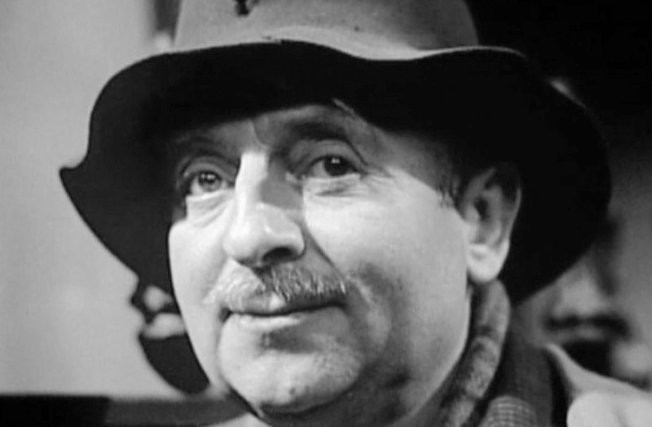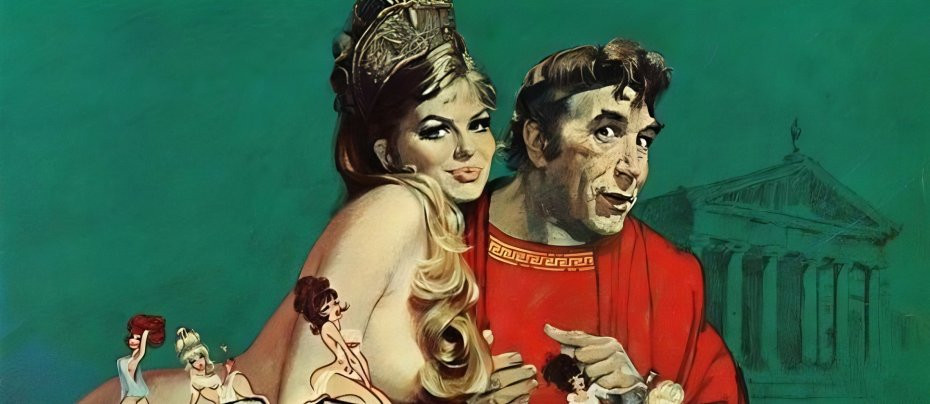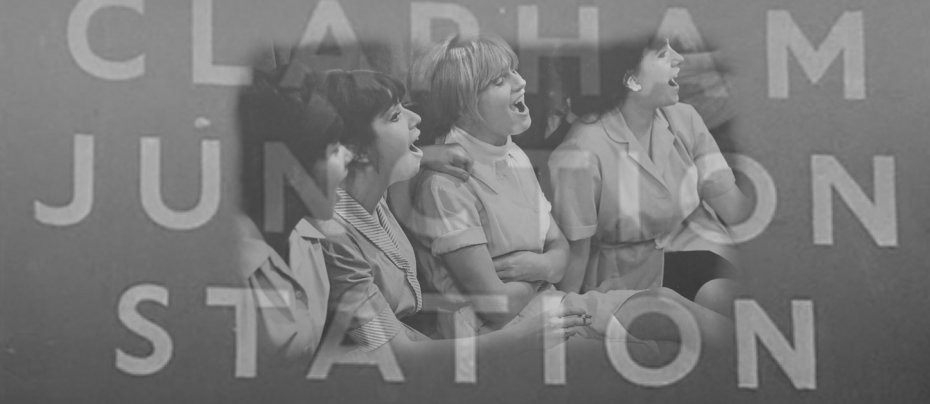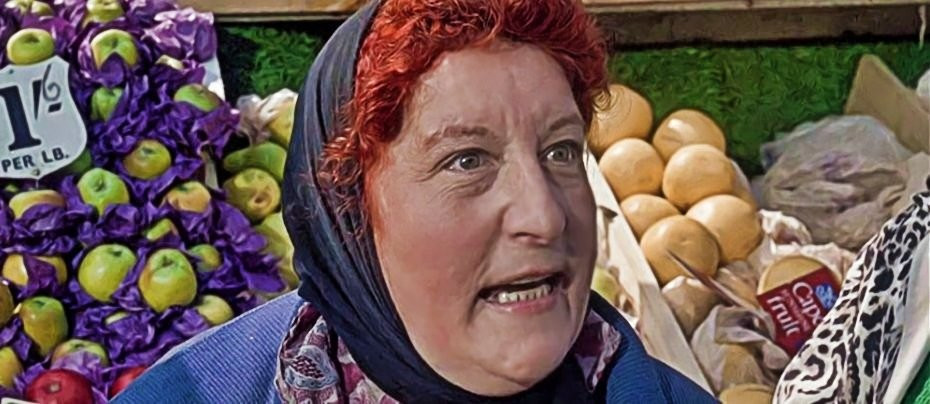
Rita Webb
She was billed as Britain's best-loved 'old ratbag', her fame growing from her size, her cockney accent and her craggy face - in her own words "the face of an old hag," Rita Webb was a raucous scene stealer who remained as down-to-earth off the screen as she was on it. "There are millions of raving beauties but a strictly limited number of old hags like me," she told reporters. "Men and women like me. Television is such an intimate thing. I come into their homes, I make the plainest woman look beautiful, so she likes me. Men see me on the screen and think 'gawd, my old woman isn't at all bad looking compared to that!' In 1966, James Hartley, writing in The Stage, summed up Rita Webb's appeal more meaningfully: 'Rita, with the depth of her personality, the compassion of her understanding, and a rare capacity for living, makes the pretty-girl look as pale and insipid as Vichy water.'
Her responses to questions about her life were usually edited for the more delicate readership. One reporter admitted that her liberal use of four-letter words required such censorship. Bernie Winters said, "Rita was funny in herself and people invited her to parties because she could be so outrageous. She was never short of the odd word and didn't mind who was there. But she was never nasty. She could be hysterically funny, even when rehearsing for a show."
An article in the Grimsby Daily Telegraph in 1972 referred to her as a 'warm, human, cuddly bundle of grass-roots jokiness and homespun philosophies. Talking to her is more like an early-morning heart-to-heart with the office char than a serious interview with a lady who has been in the theatre since she was 14.'
Olive Rita Webb was born on 25 February 1904 in Willesden, Middlesex (now Brent). She was the eldest daughter of Henry Augustus and Rose Jeannette Webb who, two years after Rita's birth, gave her a brother, Henry Richard, who later nicknamed her Bunty. Her mother had been married previously and had given birth to two identical twin brothers, Leslie Joseph and Gordon Louis Durlacher. Two years after Henry Richard’s birth, Rose died from breast cancer. Whilst Olive and Henry stayed with their father, the twins were sent to live with their Grandma Julia, and Rita lost touch with them. Her father eventually settled down with another woman who reportedly treated Rita and her brother so badly that Rita would leave home.
"I ran away from home at the age of 14 and because I looked 18, I managed to get a job as a chorus girl (at the Metropolitan Theatre, Edgeware Road) for 35 bob a week,” she later recalled. “In those days my family thought theatre was quite shocking, nearly as bad as being on the streets, and they set out to haul me back home. After two months they found me and brought me back. But I was still dreadfully restless, so at 15 I got married to a young chemist, seven years older than me, and left home that way instead.” However, a check with the England and Wales Civil Registration Marriage Index gives the date of the wedding as 27 February 1926 at Brixton Registry Office.

Six months after the wedding her father died, and soon after that her marriage began to break up. At this time, now a separated and orphaned 22-year-old, she started in the music hall becoming half of a patter act. Around 1938 she met the love of her life, Al "Mr Banjo" Jeffery. She told reporters in 1972, "When I first met him I thought he was a silly so-and-so, but he played like a divine God". They affectionately referred to each other as Jeffie and Podge. Although she was not divorced from her estranged husband, Rita and Jeffie set up home together and around that time she virtually gave up performing. He bought her a wedding ring, although they never married, which was never an issue for them until some years later when Jeffie was approached by the producers of This Is Your Life. Concerned that the show might reveal their non-marital status, Jeffie, on behalf of Rita, declined to take part. Years later Rita would jokingly tell people, "Did you ever hear of an actress refusing to be on This Is Your Life?, well you have now, because' I bleedin' well did!"
In 1949, Rita returned to performing in local theatre and a report in the Kensington Post, dated Friday 27 May 1949 filled in a few gaps on what she had been doing out of the public eye:
‘Appearing in the 'Lunch Time Variety' at the Gateway Theatre, Westbourne Grove, this week, is Rita Webb. Not only is she no stranger to the variety stage, she is no stranger to North Kensington Audiences. Miss Webb was in variety before the war, and has recently appeared in several plays of the Thalians, West London amateur drama group, at the 20th Century Theatre, a little way down from the Gateway.
There she is remembered by many for her excellent character performances, as the self-centred, rather comical mother of the brood in 'Pride and Prejudice' and as the frustrated, spiteful senior nurse in 'Jupiter Laughs.'
Miss Webb gave up the stage when she married eight years ago, to do war work and keep house in Chepstow Road, Notting Hill, for her husband, banjoist Al Jeffries.
After the war, Miss Webb toured Europe, partly recovering from an illness but also appearing in variety acts in several countries on both sides of the Iron Curtain. As a housewife, she had a hankering after the stage, and went into the Thalians; now she has given into it completely and gone professional. Her performance in 'The Townsends' at the Unity Theatre last month won her enthusiastic Press notices. Although she wants to play straight parts, she is going back into variety with her lunch-hour patter number. But she still keeps house and cooks.’
Other stage appearances were as Aunt Helen in The Townshends, which garnered a review that said: ‘Miss Rita Webb as the sister who long ago taught her husband his place, is racily funny.’ She played in many other productions among them Impure Thoughts, The Winslow Boy, Flowers in the Living, Robert's Wife, Pygmalion and The Lady Mislaid. Her stage career was burgeoning.

"Then I saw television and knew I had to put in my two penn'th," she told journalist Alan Morris in 1961. "So I started shoving letters along to producers. After a while, I had a reply. It said: 'Sorry I've nothing to offer you, but don't stop writing, your letters are amusing.' I replied that I'd continue - if the BBC sent me paper and stamps.
"That didn't help, but eventually I found myself among a dozen women at an audition and Robert Barr picked me for a documentary." Rita Webb's BBC career began on Radio in 1949 in the Wednesday Matinee play called Pastoral Symphony, which broadcast on 24 August at 3.25 pm on the BBC Home service. Rita was billed as Mrs Crump and Mildred the Maid.
Another audition, at Ally Pally, saw her signed on for a fee of seven guineas with a one guinea rehearsal fee. After that, the BBC did most of the writing and the offers kept coming in. She made her screen debut in 1950 in an episode of the BBC police procedural War on Crime which was broadcast live on Monday 7 August. One critic wrote of her brief appearance as a landlady, "I would not have missed Rita Webb's delightful character cameo, which gave an all too brief sparkle to the half hour."
Rita found an instant rapport with the television camera. "Television brings out the person behind the eyes, and my only regret is that few writers like tackling women's roles. The ratio seems to be 16-1 in favour of men. Still, TV uses such a variety of themes that it is constantly finding fresh talents among performers." By the end of the 1950s, Rita had appeared on screen almost forty times.
An appearance in the BBC series The Common Room won particular praise from critic Phillip Purser: ‘Massive, sly, vaguely socialist, Mrs Charnley, the school cook, loomed like the rock of Gibraltar over the first of Leo Lehman's new series, as played by Rita Webb this is easily the most monolithic character television has thrown up lately. But will Mrs Charneley bulk so large in succeeding episodes? Presumably not. In which case she should be instantly leased to Jimmy Edwards Chiselbury School. She is too good to waste.’ Whilst Peter Black of the Daily Mail was equally as enthusiastic: ‘I am bound to say that Rita Webb as the fearful cook, the hostile dispenser of mince and wet cabbage, dominated this episode so much that it’s hard to imagine the rest of the series without her.’
Interestingly enough, the roles offered to Rita in the 1950s mainly consisted of straight parts in programmes such as Scotland Yard, Dixon of Dock Green, Emergency-Ward 10, Interpol Calling and Tales from Dickens. As the 1960s began, television producers took notice of her natural comic timing and began considering herself as a comedic actor.
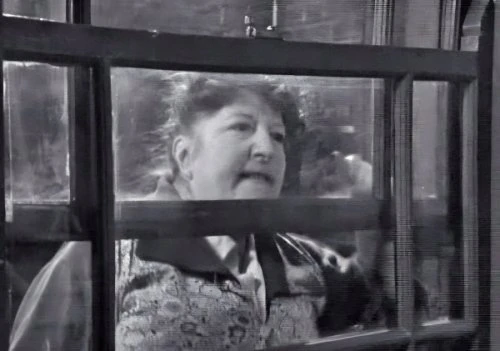
The parts that Rita was cast for were never leading roles but they weren’t always without compensation. In December 1961 she told the Aberdeen Evening Express that she had spent "three of the most glorious days of my life" during the filming of an episode of Maigret. She played the part of a blackmailing postmistress. "They killed me off after two pages, the stink-pots! Not that I really minded, darling. There we were in a village outside Paris, practically shooting the film sequences off the cuff. It should have been tricky. With that team it turned into a holiday. Rupert Davies practised his fluent French; Rudolph Cartier knew precisely which way he wanted your head for the camera. And the villagers were roped in as mourners in a funeral procession. It would have been criminal to use make-up on them. What a bunch of characters..."
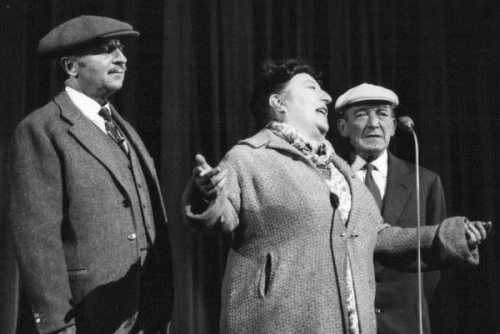
But comedy roles were beckoning and after six appearances on Citizen James, the series created by Galton and Simpson for Sid James after he was unceremoniously dumped by Tony Hancock, Rita joined The Arthur Haynes Show in 1963. And it was that move that cemented her reputation as the ‘rat-bag.’ She appeared in nearly 30 episodes, mostly as a landlady, a mother-in-law, or a Cockney character. She often played opposite Haynes and Dermot Kelly, who portrayed tramps or other low-class characters, but nearly always as loud, blowsy and equally uncouth. She also showed her versatility by playing a French waitress, a nanny, a nurse, and a singer. It doesn’t take television long to typecast an actor in a particular characterisation and Rita played her parts so well that she would find it hard to break out of character for the rest of her career.
Even a critically acclaimed performance in Ken Loach’s Wednesday Play production 3 Clear Sundays didn’t lead to more dramatic roles. It should have done. In this play, Rita is the mother of dull-witted young labourer Danny Lee (Tony Selby) who is sent to prison for a minor crime. But whilst inside he is talked into attacking a guard who later dies. Lee is subsequently given the death penalty. Rita dominated the production and Richard Sears writing for the Daily Mirror raved, ‘There were some wonderful scenes with Danny's mother, played by Rita Webb with haggish joviality’. Robert Kemp wrote, ‘Rita Webb was a remarkable but entirely credible monster as his mother.’ The Stage commented, ‘Unquestionably it gave an opportunity to Rita Webb that she has long deserved. If anyone could be said to have shared the honours with Tony Selby it was she. She never let us love the old harridan with a rasping voice and sloppy emotions, but we had to admire her as matriarch of 'tea leaves' (thieves). Variety praised an outstanding portrayal from Rita Webb as the ‘raucous, unscrupulous hoyden of a mother.’
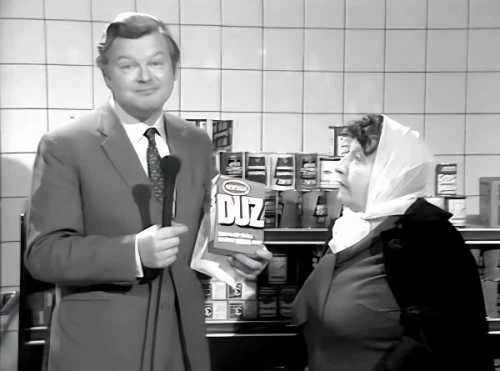
Rita flew to America and appeared on the Ed Sullivan Show and played Salome in Ken Russell’s highly controversial TV play Dance of the Seven Veils. In a letter dated 22 May 1969, Rita wrote, "How far is 'Salome' from the Virgin Mary-it only needs a little imagination! You must watch me in Salome, I wear a woollen body stocking-it will put you off women for life and save you a lot of money!" Also in 1969, she made the first of her many appearances on The Benny Hill Show.
Throughout the 1970s she would turn up in guest roles in programmes such as Till Death Us Do Part, Sykes, Space: 1999, Mind Your Language and The Quatermass Conclusion, the latter of which was uncredited. She won plaudits for her role as Granny Miggs in Stratford East’s stage production of The Londoners.
Rita passed away on 30 August 1981. The Scotsman reported her death the following day which revealed 'Only a month ago she confided to her friend and colleague Arthur Mullard her fear that she had cancer. He tried to persuade her to go to hospital. She was admitted to the Samaritan Hospital for Women on August 9 and died there yesterday morning.'

Peter Eldin, who conceived the children's TV comedy series Whizzkid's Guide, which starred Rita as well as Kenneth Williams and Arthur Mullard dressed up as schoolkids ("as you can imagine, there was a lot of mayhem and plenty of laughs") remembered that after every scene, Webb would go straight over to him for approval and ask, "Was that alright, darlin'?" According to Eldin "She insisted on taking one of my children's books with her for one scene so it would be seen on screen. A lovely lady."
In 1966 she told reporter Valerie Green, "I'm not a religious person myself. But I believe in doing to others as you would be done by. Each Christmas I give to a Jewish charity and the C of E - in memory of my late father - then I think I can't leave the Catholics out in the cold and give 'em something. My entire earnings for Christmas week go to charity. I've got a lot to be thankful for, you see." Rita was half Jewish, half protestant and could never understand why atrocities were committed in the name of religion. "I wish we could all love each other. My religion is really just being a human being."

Rita worked with some of the best-known names on British television. She was often the comic foil to Arthur Haynes, Ken Dodd, Tommy Cooper, Spike Milligan and Frankie Howerd, and probably every other British comedian during her lifetime. Even Hollywood royalty knew her. "I've worked with Elizabeth Taylor in Suddenly Last Summer and with Gary Cooper in his last film The Naked Edge," she would proudly recall in later years. "He (Cooper) was marvellous. He used to bring me home to my door in the car every night. After that all the kids in the street wanted my autograph." And yet, she was joyfully self-effacing at other times. "I'm just a working girl in the theatre because I love it. If I didn't work I couldn't bloody-well eat.”
“I haven't much talent for anything (else)," She'd admit. "I'd probably (have) end(ed) up as a lavatory attendant, wiping the seats or whatever they do.”
There's a dedicated website in tribute to Rita Webb at ritawebb.co.uk
Published on December 30th, 2023. Written by Marc Saul for Television Heaven.





